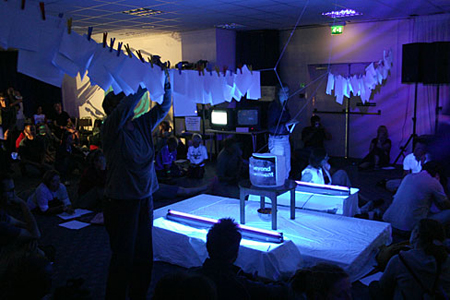| |
 |
 |
 |
| The story so far... |
 |
| You're currently on our features and projects pages, with material ranging from the satirical to the theological. For more features, click here. |
| |
|
|
| Anyone for really alternative worship? |
 |
 |
 |
| Is alternative worship genuinely alternative? Theo Hobson steps outside the Church of England in search of worship that kicks the institutional habit. |
 |
About six years ago I started feeling increasingly detached from my native Anglicanism. The big problem for me was establishment – I couldn't condone Christianity being linked to nostalgia for a pre-liberal, pre-pluralist world. But no other church grabbed me – the others seemed less liberal. I realised that my issue was not just with establishment – it was with institutionalism. Every form of institutional church seemed addicted to rules, authoritarianism.
I wanted Christian culture to move away from institutionalism. But how? At around the time that I started asking such questions, the Church of England started talking a lot about "fresh expressions", "new ways of being church". But the actual proposals seemed paltry – the whole initiaitive seemed to me a distraction from the real issues, a smokescreen. How dare the Church point to a few trendy attempts at alternative worship within a few of its parishes as evidence that it was rethinking its mission? I'm not knocking these alternative services: I'm just saying let's not pretend there's more radicalism here than there really is.
But what sort of change did I favour? Well, I'm sorry if it sounds over-the-top, but I decided that a complete revolution was needed in how Christianity happens. In order to capture the public imagination, it must kick the institutional habit – and be what? Well, why not think of Christianity as a form of culture, like art or music, which happens freely and takes endlessly diverse forms? If music thrives without being regulated, why can't Christianity? The conventional reply to this is that institutions are needed to protect "orthodoxy"; without rules there would be chaos and heresy. Also, institutions are needed to keep Christianity's ritual life going, and this is its core.
I realized that the latter argument is strong. Christianity does need to be publicly, ritually expressed. So the question that became central for me was this: can Christian ritual be detached from institutionalism?
The answer is yes, but only if "ritual" is radically re-thought. It must be purged of its attachment to institutionalism. The two main sacraments are deeply institutionalized: baptism defines authentic Christianity as allegiance to the baptizing institution, and in almost all churches the eucharist must be performed by an institutional employee.
So what might happen instead? My idea was that a group of people could meet in a park, form a circle and make some Christian signs together. They could pass round the sign of the cross, kneel in penitence, share bread and wine. It felt important that it should happen in public space: it should be open to anyone, and visible to passers-by. Maybe the Lord's Prayer could be said, but there should no sermons, no one in charge holding forth, pushing an orthodoxy. It should be a minimalist event of Christian communication, on the border between worship and performance art. Perhaps there could be a touch of drama, of spectacle: some drumming, some mild dancing; there could be a slightly "primitive" feel. I like the idea of showing the victory of Jesus Christ over evil with a little "exorcism" motif: someone wears a scary mask, and the others defeat the "demon" by making the sign of the cross.
So far I have put the idea into practice on only a small scale, with my wife and children (admittedly we have being doing an indoor version in the recent freezing weeks). It's part of our routine now, like going to church is for other families. I am hoping it will gradually attract a few others, catch on, become a little "cult" (in the harmless sense of "worship form").
Why do I bother with this weird idea? Because I want to express my Christian faith in a way that I can feel comfortable with. I cannot feel comfortable with churchgoing: it makes me feel implicated in things I disagree with (one of these is the Church's education policy, which encourages pushy parents to fake faith out of self-interest, to get their children into Church schools). Also, because I want there to be new bits of Christian culture that provoke the interest of our society. I like the idea of non-Christians looking on out of curiosity and being prodded to think again about what this religion is about.
Some will say that my rejection of institutionalism is naïve: if this ritual in the park were to catch on, then surely it too would become a sort of institution, with a tacit orthodoxy. Well, I would like to see lots of different "DIY rituals" springing up – let a thousand flowers bloom. Maybe some will take the form of music or street theatre. Maybe others will experiment with public art. Let's have a free-style movement that knocks Christianity out of its failing box! Once it gets a bit warmer, please get in touch and join us in the park. It'll be fun! |
|
|
 |
 |
| Theo Hobson is a regular writer for Comment is free on the Guardian. Visit Theo's website. |
 |
| Photo left: Steve Collins, Small Fire |
| |
|
|
|
|


